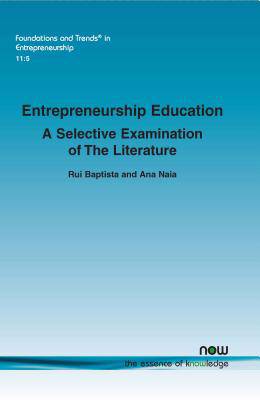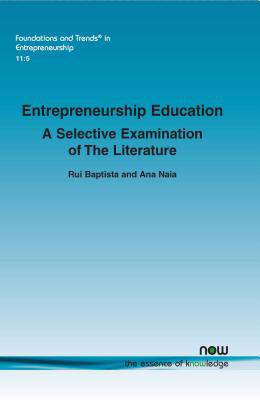
- Afhalen na 1 uur in een winkel met voorraad
- Gratis thuislevering in België vanaf € 30
- Ruim aanbod met 7 miljoen producten
- Afhalen na 1 uur in een winkel met voorraad
- Gratis thuislevering in België vanaf € 30
- Ruim aanbod met 7 miljoen producten
Zoeken
€ 69,95
+ 139 punten
Omschrijving
Entrepreneurship Education: A Selective Examination of The Literature provides an analysis of the progress made in the field of entrepreneurship education by looking in particular at the contributions made to theory and at the challenges that keep emerging in practice. The authors build two different frameworks of analysis in order to examine recent literature on entrepreneurial education at two levels: (i) theoretical contributions, and (ii) emerging challenges and solutions in the entrepreneurial classroom. These simple frameworks are used to classify and analyze articles published on the subjects of entrepreneurship education, encompassing methodologies, theories, contents, frameworks and evaluation of programs/subjects, selected from a wide range of journals in the fields of Management and Education over the period 2000-2011. Entrepreneurship Education: A Selective Examination of The Literature is organized as follows. After an introduction, Section 2 looks at the roots and emergence of entrepreneurship education, and its progress towards the end of the 20th Century. Section 3 presents and discusses the methodology used to select the papers examined for the purpose of applying the frameworks. Section 4 presents a simple framework of analysis to classify and assess theoretical contributions, and applies it systematically to the papers selected in Section 3. Section 5 presents the second framework of analysis, targeted at problems and solutions emerging from practice in the entrepreneurial classroom, and applies it to the surveyed literature. Section 6 concludes, reflecting on the value and limitations of the analysis while providing suggestions for future research
Specificaties
Betrokkenen
- Auteur(s):
- Uitgeverij:
Inhoud
- Aantal bladzijden:
- 106
- Taal:
- Engels
- Reeks:
- Reeksnummer:
- nr. 51
Eigenschappen
- Productcode (EAN):
- 9781680830828
- Verschijningsdatum:
- 28/12/2015
- Uitvoering:
- Paperback
- Formaat:
- Trade paperback (VS)
- Afmetingen:
- 156 mm x 234 mm
- Gewicht:
- 158 g

Alleen bij Standaard Boekhandel
+ 139 punten op je klantenkaart van Standaard Boekhandel
Beoordelingen
We publiceren alleen reviews die voldoen aan de voorwaarden voor reviews. Bekijk onze voorwaarden voor reviews.











